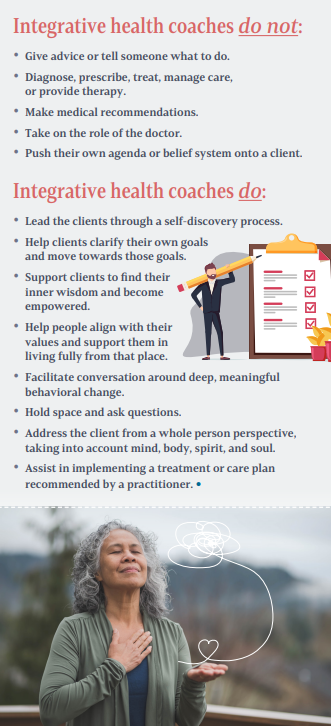Book Excerpt: An Integrative Health Coach Approach
Photo Cred: Ground Picture/Shutterstock
By Integrative Practitioner Staff
According to the Andrew Weil Center for Integrative Medicine (AWCIM), integrative health coaching is defined as a “client-centered, relational approach to working with individuals collaboratively to address the health and wellbeing of the whole person. It acknowledges the interdependent roles of mind, body, and spirit, and the innate healing capacity within each person, with an emphasis on self-care,” as described on its website.
“I do think in our current healthcare crisis, a health coach is the person who understands what motivates people to make changes in their life and stick to them,” said Theresa Nutt, MA, BSN, RN, codirector of the Integrative Health and Wellbeing Coaching Program, at University of Minnesota’s Center for Spirituality and Healing. “That is the missing link in our healthcare system.”
When people have life issues and challenges they are dealing with, they can easily read a book or Google how to be healthy to get tips and strategies on what to do. But it’s the actual day-to-day behaviors and barriers that need to be addressed if lasting change is the goal. For Nutt, the health coach provides a little extra time to understand the person at an individual level and truly help them get practical about making a change. “That’s what makes integrative perfect,” she said. “We’re not just looking at one small piece of who they are.” Integrative health coaches start where the client wants to start.
As Nutt said, if a smoker knows they need to quit smoking but isn’t ready, the coach will start with something easier. This strategy helps to build skills, tools, and confidence with the idea that one day that client will be ready to quit smoking.
“Effective integrative health coaching rests on a foundation of holism, is relationship-centered, and holds the client to be ultimately resourceful and has a narrative that is central to a healing process,” said Meg Jordan, PhD, RN, NBC-HWC, chair of Integrative Health Studies at the California Institute of Integral Studies (CIIS) in San Francisco. “You don’t get there through typical goal-driving coaching dialogue. A deeper narrative of trust and rapport must be built.”
At the heart of these conversations, Jordan said there is the understanding that the client is whole, that they don’t need fixing, and that they have a life full of experience. “You need to remain curious about speaking to somebody from a very time honored, canon of positive psychology and that is something that integrative health practitioners really need to understand,” she said. “The client’s needs and preferences are really central. That co-created wellness vision is the start of a healing journey, and you are the guide, but you’re not directive or prescriptive. You are shining a light on the path, but you’re not making the choices, or diagnosing, or treating.”
Aside from being patient or client-focused and meeting that client where they are on their journey from a connected mind-body-spirit perspective, at the core of integrative health coaching is mindfulness, not only with the client or patient, but within the coach who is practicing. More specifically, the coach must have the ability to ground in self-care and self-awareness so they can be an active, present listener for their client.
“Coaching, integrative coaching in particular, is a growth fostering relationship,” Wolever said. “In order to really support growth of someone else, a coach has to be super present, really well regulated so they have an embodied ability to attend to the client’s agenda. When coaches are not self-regulated, have too much anxiety, or distraction, or are really reactive, they can’t possibly hold the space needed for the client.”
Coaches as a result, need to have a toolbox of practices of self-soothing and self-regulation, according to Wolever. This is part of their learning.
For Nutt and her program at the University of Minnesota, it’s about the coach’s growth and development and learning how to know themselves fully. It’s also about identifying blind spots and developing a self-care routine. “What does it feel like when I’m really stretched,” she said. “Because when you know that for yourself, you’re able to hold more space for others.”

According to a 2013 study published in Global Advances in Health and Medicine, in which Wolever was a co-author during her time at Duke University, “integrative health coaching draws from several techniques sourced from humanistic and positive psychology, solution-focused, and mindfulness-based therapies, and leadership coaching to empower patients through various stages of learning and change.” The results of that research found that, “clinical studies employing Duke University Integrative Medicine’s model of integrative health coaching have demonstrated improvements in measures of diabetes and diabetes risk, weight management, and risk for cardiovascular disease and stroke. By supporting and enabling individuals in making major lifestyle changes for the improvement of their health, integrative health coaching carries the potential to reduce rates and morbidity of chronic disease and impact myriad aspects of healthcare.”
The underlying theoretical model of integrative health coaching, according to another 2013 study published in Global Advances in Health and Medicine, said that “behavior changes can be sustained when linked to personal values and sense of purpose. Integrative health coaching helps clients to access the motivation needed to initiate and maintain change by facilitating their ability to consider new perspectives and work with numerous factors that contribute to achieving goals. Such factors include accessing resources and supports, overcoming internal and external barriers to change, and generating alternatives, workarounds, and back-up plans for planned action steps.”
Editor’s note: This article is an excerpt from the e-book Nutrition Foundations for the Gut Microbiome. Click here to read more.
















